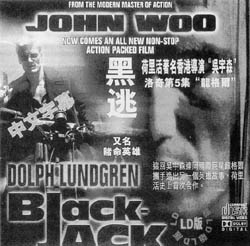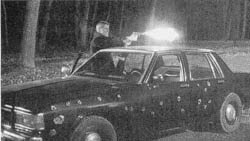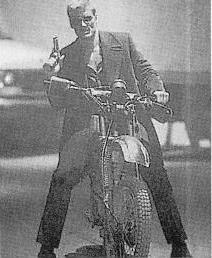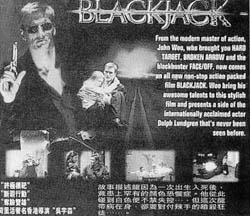
|
 |

|
 |
    |
By Helmut Schveinhardt, Impact (UK), July 1998 Helmut Schveinhardt checks out the pilot for John Woo's latest pilot If John Woo is indeed God, then Blackjack is one of his lesser children. Having said that, it's far better than most of the films that feature its star, Dolph Lundgren, and wa-a-ay better than most Canadian-based action shows, including Woo's own Once A Thief. Maybe I'm alone in this, but I never for a moment look at the bland backdrops of Vancouver or Toronto and mistake them for the mean streets of New York, Chicago or L.A.. At least with Blackjack the foreground action is engaging enough to make such matters only incidental to the proceedings. Given the demands of American made-for-TV action (minimum sex and blood-letting, family values, a good, old-fashioned hero), Blackjack: The Pilot delivers, and may yet make a Walker: Texas Ranger out of Dolph Lundgren... Lundgren is Jack Devlin, a former U.S. Marshal called back into the line of fire when a casino owner friend is threatened by gangsters. When the villains try to get their hands on the man's daughter, Devlin protects her. The ensuing shoot-out features some unique Woo touches. Blinded by a flare, Devlin must rely on the girl he is trying to protect to direct his gunfire. Though both survive the shootout, Devlin is left with an affliction that provides the film with its most intriguing twist: He has a phobia of the colour white, and must wear dark glasses at all times. Naturally, Woo exploits this, setting action sequences in a hospital, amid billowing white sheets and even in a dairy! The downside is that this psychological affliction means Devlin has to be in therapy. Naturally, his shrink is an attractive woman who falls in love with him, and is happy to make house-calls. Fred Williamson, undergoing a post-From Dusk 'Til Dawn career resurrection, is Tim Hastings, another former US Marshal who can't keep away from the action. His private security company is assigned to protect top model Cinder James, who is being threatened by someone who appears to be an obsessed fan. It's in the relationship between Devlin and Hastings that Woo introduces the major recurring theme of his work, the concept of duty, of a bond between brothers. Hastings says of Devlin: "He's slow to make a promise, quick to keep it", a credo that has motivated every Woo character from Mark Gor onwards. When Hastings is seriously injured by the would-be assassin, Devlin agrees to take over the job of keeping James alive. This leads into the film's main plot, one very reminiscent of The Bodyguard, in which Devlin forms an emotional, though non-physical, relationship with the girl. Matters are complicated by the fact that his casino buddy and his wife have finally bumped off, leaving him with custody of their daughter. Luckily, Devlin is aided and abetted by a one-eyed partner in crime. Saul Rubinek is perfectly cast as a man equal parts butler and arms leader. In terms of his physical appearance alone, Lundgren is an enigma. Emotions ripple across his chiseled face like light across a statue. At times, his features seem classically handsome, at others, he's like some modern day Frankenstein, a resemblance exploited by Roland Emmerich in Universal Soldier. Though he may nver have made it into big-screen, big leagues, Lundgren has the one element necessary to be a successful TV action hero. His smile has a natural warmth, one seen infrequently in his movies, and used to best effect in the underrated Red Scorpion and Dark Angel. He's actually underrated as an actor, something a long run in a TV series will give him time to correct. If the Blackjack series can find some better dialogue writers, and avoid embarrassments like the scene in which Devlin and James ingage in some ballroom dancing, it may run and run. back to top |